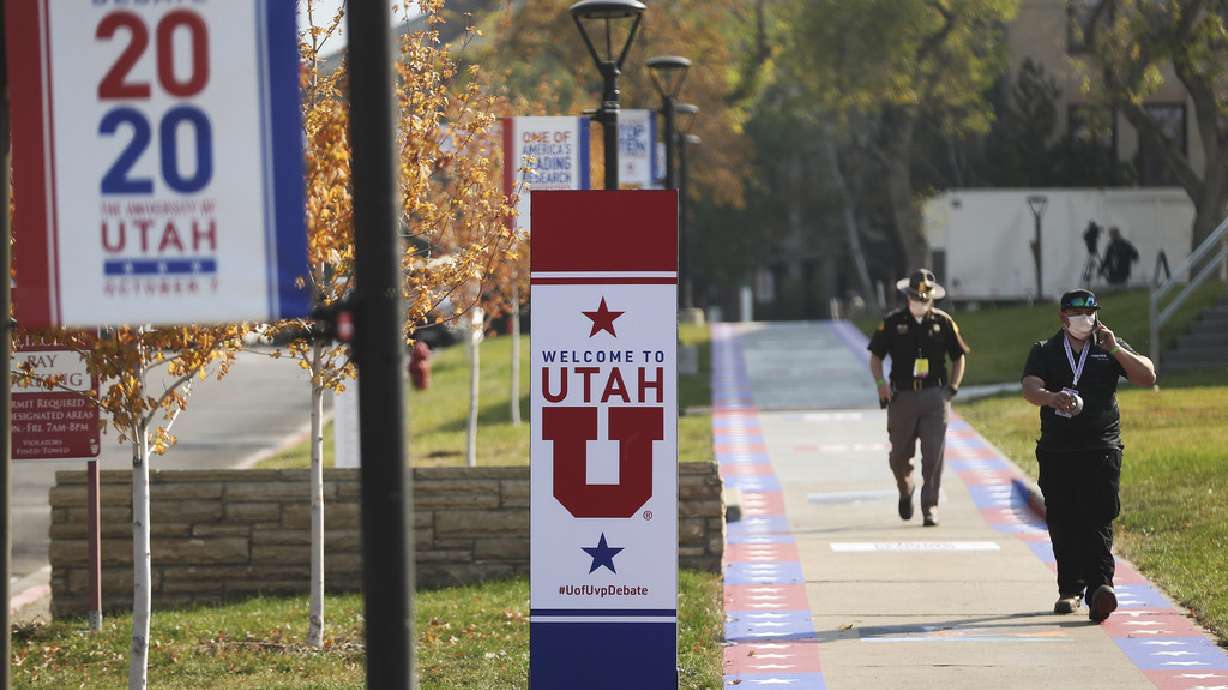Estimated read time: 5-6 minutes
This archived news story is available only for your personal, non-commercial use. Information in the story may be outdated or superseded by additional information. Reading or replaying the story in its archived form does not constitute a republication of the story.
SALT LAKE CITY — The University of Utah first submitted a bid for a presidential debate in March of 2019.
It won the honor to host the final 2024 presidential debate late last month.
Here's a look behind the scenes at how the U. and state politicians worked across party lines, for years, to bring the event to Utah.
What does the selection process look like?
The U. submitted its application to host a 2024 debate to the Commission on Presidential Debates — a nonpartisan organization which has sponsored all of the presidential debates since 1988 — approximately six months ago, said Jason Perry, director at the U.'s Hinckley Institute of Politics.
Sites considered for the 2024 debates are required to have facilities large enough to host candidates and spectators, but also additional security and media interested in the event, Perry said.
"There are a lot of logistics to consider and some facilities lend themselves better than others," he added.
Campus community and how universities plan to involve students in the debate process are also considered, Perry said.
The Commission on Presidential Debates website notes that all but three of its debates have been held on university campuses, which "has allowed students to participate in the production process, and has prompted many of them to become involved in election-related projects."
Perry said the U. has involved students in the debate process by hosting statewide essay competitions and involving students and volunteers in debate events.
Utah has outsized influence in national politics has been that way for a while.
–Jason Perry, Hinckley Institute of Politics
After facilities and student involvement criteria are met, commission staff visit their top sites in order to see potential host buildings and talk with the people who would manage the debates, he said.
The commission also consults "with members of the White House television pool and federal law enforcement" to ensure that sites are suitable.
"After that, they do their own internal decision making process and then they call and let you know if they would like you to be a host site," Perry concluded.
2020 debate proved the U. could do it
The 2024 presidential debate might not have happened without the U. having successfully hosted the vice-presidential debate in 2020.
"You have to look at what's happened here and go back to 2020, when we hosted the vice presidential debate," Perry said. "It happened at a time during the pandemic when the logistics were very, very difficult."
The debate was imperiled after then-President Donald Trump tested positive for COVID-19 shortly after debating Joe Biden. The University of Utah implemented various safety measures to keep the debate in-person, including placing tables 12 feet apart from each other, testing participants for COVID-19 and placing plexiglass between Vice President Mike Pence and Kamala Harris.

"The University of Utah, with the experts across the country and in our amazing health care system, developed a way for us to have the debates in spite of what was going on all around us. That fact was not lost on the Commission on Presidential Debates," Perry said.
"The state of Utah — and the University of Utah in particular — really came through," he said. "Kingsbury Hall turned out to be an ideal location for debate."
"In terms of layout, it's perfect," Perry added. "Given our experience in 2020, it was a known commodity to the Commission on Presidential Debates. Without question, that was a key factor in the decision-making process."
Bipartisan support behind the scenes
Major officials across Utah supported hosting the debate throughout the bid process.
Gov. Spencer Cox, Salt Lake City Mayor Erin Mendenhall, Utah Senate President J. Stuart Adams, Utah House Speaker Mike Schultz, U. President Taylor Randall, and Perry worked together and supported the bid from the beginning.
In 2020, the Utah Legislature also appropriated $2.5 million to fund the vice-presidential debate, and the U. privately fundraised a similar amount, KSL NewsRadio reported.
Utahns should look at this with a sense of pride that it's coming here, and knowing that, when it comes to politics, people do care what Utahns think.
–Jason Perry, Hinckley Institute of Politics
The university will soon talk with the Legislature about funding for the 2024 debate, Perry said.
"This is one of those opportunities that had no political opposition and is beyond just party," he added. "When it came to working with the city and with the county and other elected officials — everyone was on board."
"Not every state has a university that does submit an application, but there are many that do," Perry said. "Showing that you have support from every party, from every segment of your state, goes a long way. You add that to a premier facility and you have a pretty compelling case."
The U. will host the third and final presidential debate on Oct. 9, 2024.
Perry sees hosting the final debate as a special honor.
"I think it's a nod to the experience that the commission had with Utah in the past, but also — and we talked about it a lot — Utah has outsized influence in national politics (and it) has been that way for a while.
"When it comes to policy and when it comes to approach, Utah is seen as one of those models that many around the country try to follow," Perry said. "Utahns should look at this with a sense of pride that it's coming here, and knowing that, when it comes to politics, people do care what Utahns think."









